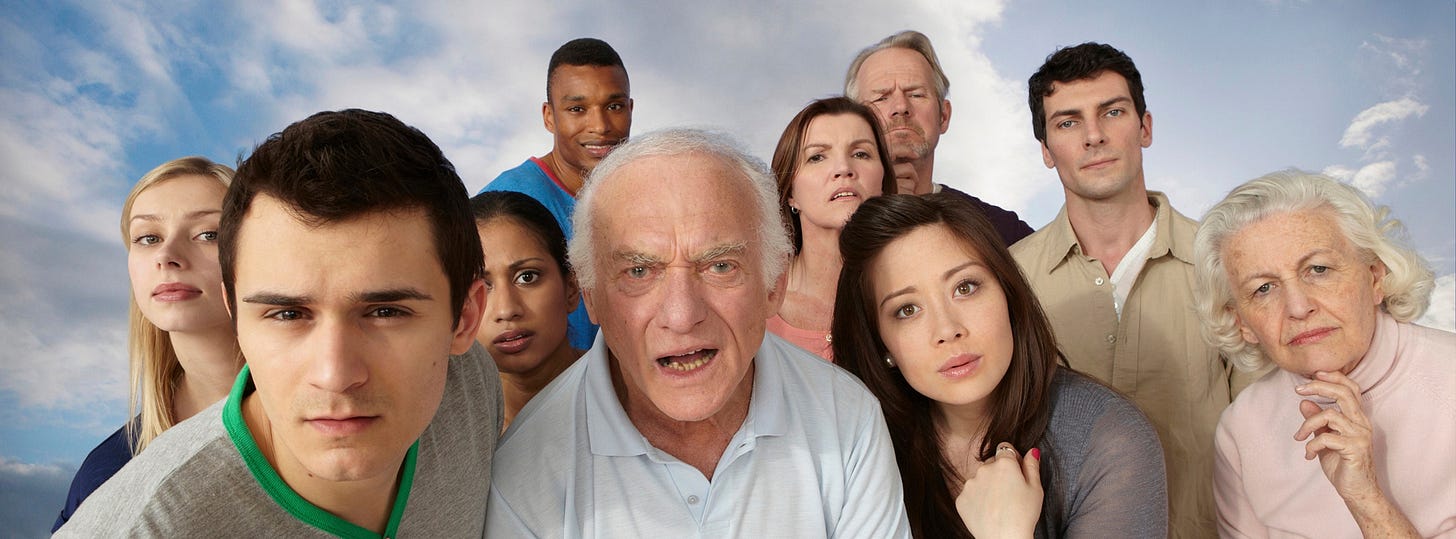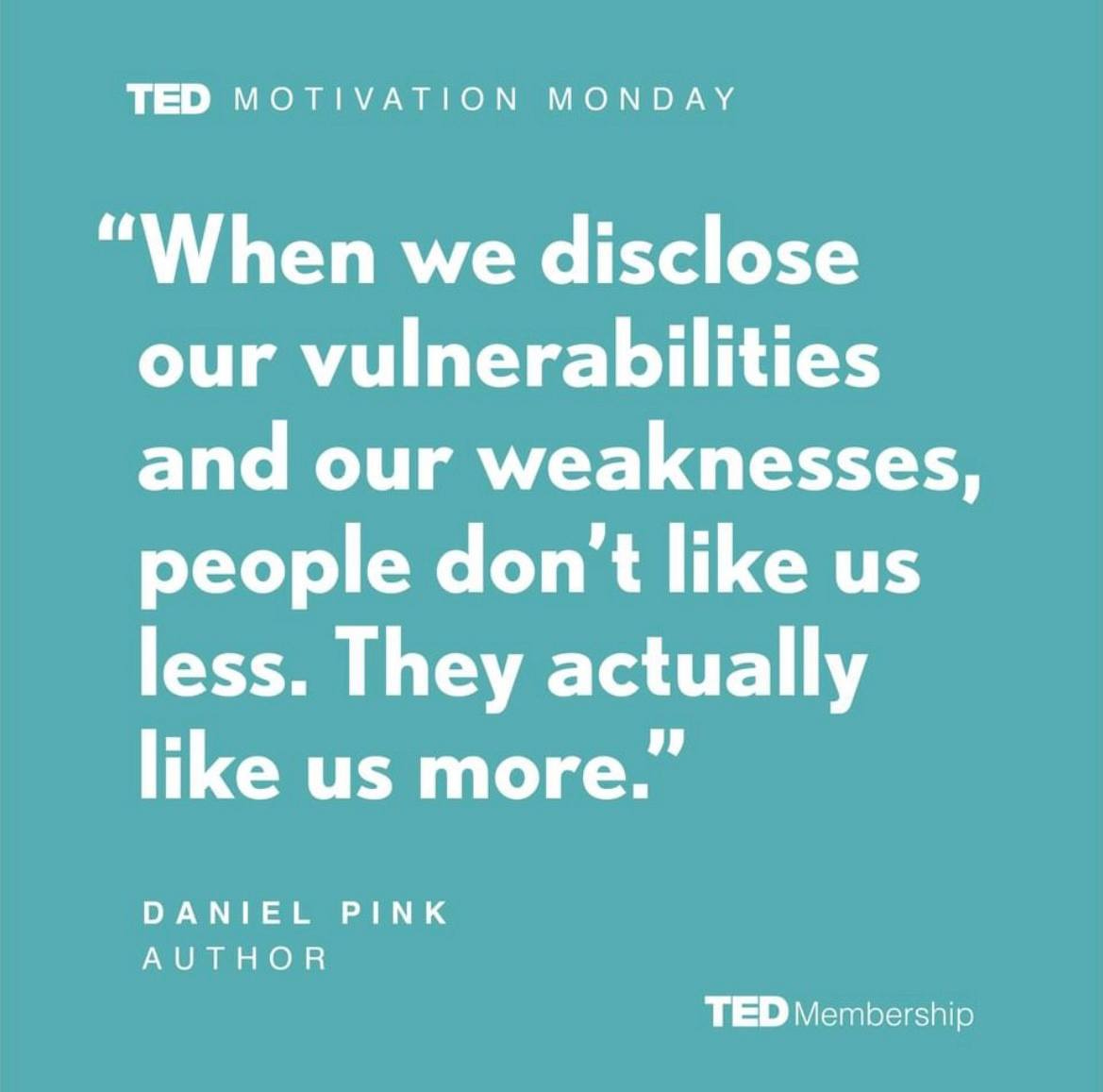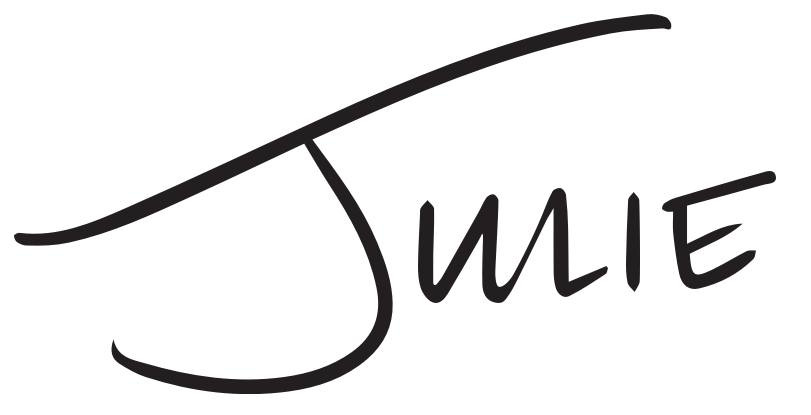This is a free newsletter. If you like it, pls subscribe so you don't miss the next one!
It's April 14, 2022. After two years of living like a hermit, I've contracted Covid. I publish a piece right here in Julie's Pod about the choices and decisions I made leading up to my positive test result. I get a lot of replies.
95% of folks can relate, are supportive, and send kind vibes.
1% chide me for having been such a snowflake for so long.
The remaining 4% believe I recklessly endangered others and say very mean things about my character.
Gotta be honest – I did not see that latter group coming.
Their accusations feel like jabs to the jaw. I throw up my hands for protection. Take a step or two backward to regain my footing. Then I peek around my hands to look at these people. Why are you so upset with me? (After all, I've done my most diligent best for 25 months, yet I let my guard down once and I got Covid, and now you're mad at ME?) Dancing on my toes as I interrogate these unexpected reactions, I don't think that what I did was wrong. So it wasn't wrong. Right? Or was it?
_____
In the early days of my convalescence, I have little energy for anything other than social media. One day I stumble upon an article that blows my mind, called "Cancelling, Crybullies, and Consequences," by Laurie Penny, which critiques the very popular behavior of demonizing those who question our behavior (e.g. 'how dare you call me a racist') when we are called out for doing something wrong (e.g. saying something racist).
Penny explains that when we've done something wrong, our shame becomes the terrible feeling that we cannot bear to face. So, while we should own it, apologize for it, and move on, instead we degrade the accuser and the accusation itself. Laurie Penny says that, "Moments like this feel like hanging on to the basket of a hot air balloon. Watching the moral high ground disappear below you. Knowing that every second you hold on, you’ll have further to fall."
A week later, when the nasty responses to my Covid story come, I force myself to ask myself Am I clinging to my hot air balloon?
____
It's March 2022, weeks before Covid will be at my door. I am interviewed on the podcast "Intersections," hosted by Columbia Business School professor Hitendra Wadhwa, which is focused on "dissolving any boundaries that limit us from exploring and advancing to our full potential, individually and collectively."
At the 15:50 mark, Hitendra asks me what I think we feel at the moment we die. He clarifies that, yes, there's the concern about what others will think of us and what we'll be remembered for, but, he says, "I also wonder if at that moment, when everything is being stripped away from us – all these identities from the outside, all these associations and relationships, and the world is just fading into the background – if it's not the case that in that moment we'll have this mirror and we will be looking at our own selves, and in that moment we will be in some ways telling our own self how do we feel about our life? And perhaps all of these attachments and ego get stripped aside. And the purity of the voice within at that moment will either smile at a life well-lived, or feel a little bit pained at some of the opportunities that were missed?"
I thank him for asking such a gorgeous questions. I tell him that I hope all of us will be well aware of who we are by that time. That we'll have done the work we needed to do, and therefore can stare at our soul in the mirror and feel love and acceptance for whom we see.
I tell Hitendra that I'm intentional about doing that character work, "to work out where do I want to grow (not to be more important, or have more money, or have a different title ) but within my being." I explain that for me, it's about asking: "Where are my rough edges? Where are the ways in which I am unpleasant? Where are the times that I am impatient? What is that about?" I tell him that I choose to work on those things because, "when I'm not combatting some insecurity within me that's making me afraid or angry, then I can show up with other humans and be more of what they need. I can listen better. I can be more helpful. Problem solving comes more easily. I can activate the things in me that want to offer things to others because I'm not encumbered, burdened by my own self."
I tell him that at death I want us to feel: "I know myself. I've been in tune and in touch with this self in my effort to grow it and heal it and help it become ever more able to be present alongside other humans in a manner that is loving and kind."
_____
On that podcast in March, I said I was doing the work. Am I?
A month later, I think I'm upset with those who've come at me in response to my story about getting Covid. But I have a gnawing feeling inside (fueled by Laurie Penny's terrific insights) that maybe my defensiveness is masking my own feelings of regret – even perhaps shame – about my choices? Am I learning and growing from this critique, or am I clinging to the basket of my hot air balloon as the moral high ground recedes further and further from my view?
I get curious to know the answer. Or at least to have this conversation with myself.
_____
Here's where I am: I can say to you that I've been afraid of this virus for reasons of self-preservation (asthma; propensity for pneumonia; pre-diabetes), and out of concern for my eighty-three-year-old mother, and out of a sense of duty to all humans. So I stand by my statement that I truly never meant to endanger anyone. I did not feel sick until I'd arrived back home in Silicon Valley, but in the same breath I can tell you that I feel anguish at the thought that I could have exposed someone on the airplane.
Our daughter, a college student in North Carolina, had recently been exposed. When we visited her, we could have either masked and distanced around her, or the three of us could have cocooned into each other and not left the house. But we were there to see both her and a show she'd choreographed. We tried to have our cake and eat it too, I see that now. And given how it all shook out – yes, I would do some things differently. Yet there was still so much beyond our control. It might have been the right thing to isolate until she got her results, but her results were negative, so we would have gone out into the world anyway. When is it that we're on the hook for knowing what we should have known?
And, I also know that critique is inevitable, that people have different perspectives and vantage points and those things are valid, and that if we're so afraid of hindsight showing us we were wrong, none of us could ever get out of bed.
In a stroke of perfect timing, as I am in the throes of my feelings, two guys I greatly admire posted wise words on the internet:
Posted by Adam Grant on 4/18/22
Posted by Dan Pink on 4/18/22
So here I am with this piece, which I offer to you in case you have been struggling with some of your own behaviors and choices.
I don't want to be so afraid – of a virus, of someone's critique – that I never get out of bed. I want to get out of bed every day. I want to accept that I'm fallible, try my best, apologize when necessary, and learn from the experience every time. With that approach, it is my sincerest hope that on my deathbed, whenever that time should come, I will be able to look at myself in the mirror and love that person staring back at me. I want that for you, too.
_____
Are you able to admit when you're wrong?
Is it easier about some topics or with some people rather than with others?
What's at stake when we apologize? Why is it sometimes an impossible bridge to cross? What do we fear it means? What do we fear will happen?
I think being able to talk about this kind of thing is so important.
Share your thoughts below!
The real-life "pod" in my backyard, where I work.
🏚You've been in Julie's Pod, an online community for folks who know that by opening up and getting vulnerable we grow and help others do the same. There are over 10,000 people in this community now, and you can join us by subscribing here. (It's free. Subscribing just means that you'll get me in your inbox so you don't have to go searching for whatever I said next.) If you want to share this with a friend, please do.
🎁 If you've read this far, you are definitely entitled to a free "Julie's Pod" sticker for your laptop, phone, or water bottle courtesy of me and the U.S. Postal Service. Just DM me your snail mail address (or if you don't know how to DM a person, just email me@lythcott-haims.com). I promise to toss your snail mail address in the trash as soon as I pop the sticker in the mail to you!
📝 If you left a comment on any post before today, here or on social media, I've probably responded, and I always appreciate what you have to say even if I may feel differently. Please feel welcome to join the conversation. I want you to.
🧐 If you missed last week's post about the day Covid found me, you can read that here. Other popular posts in Julie's Pod include one on the trauma and tragedy of youth suicide which is here, and the role parents can play in turning normal childhood fears into outright anxieties which is here.
☎️ For those who can't comment publicly, I've set up the hotline 1-877-HI-JULIE where you can leave an anonymous voicemail to let me know what's on your mind. I respond to these calls most Mondays live on my Facebook page at noon Pacific Time (while keeping the caller's identity private).
👋🏽 If you're interested in learning more about me and my work, please follow me @jlythcotthaims on Facebook, Instagram, Twitter, and/or TikTok and check out my website.
🧐Yes, I know, why am I upset about four percent of the people? In the main, how a person reacts to something tends to be more about what's going on for them than about anything someone else has done. And, they're entitled to their way of seeing things and it's okay to disagree. But it was the meanness, the character accusations, that stuck in my craw. Still, I know I cannot control others and that not everyone in life will like me. I'm farther down the path toward understanding these truths. But yes, in the imperfection of me in the now, for about three days I couldn't shake their unkind words.
😷 I feel almost entirely myself again. Just a little phlegmy cough escapes every now and then. I'm grateful to all who commented somehow somewhere, checked in to see how the fam and I were doing, brought soup to our door, and proved just how fantastic humans are.
📸 Cover Photo Credit: Getty Images/Image Source
@ 2022 Love Over Time LLC All Rights Reserved








